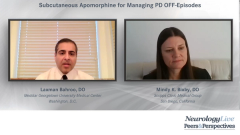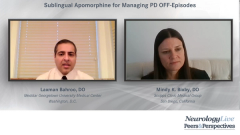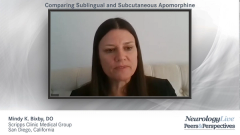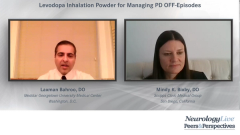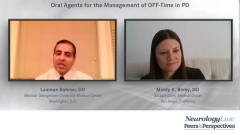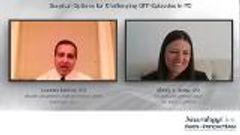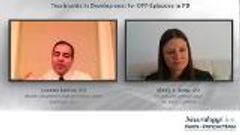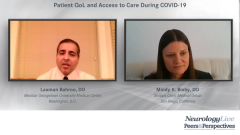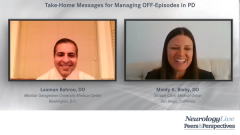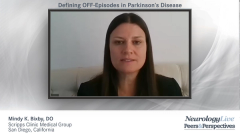
Defining OFF Episodes in Parkinson’s Disease
Laxman Bahroo, DO and Mindy K. Bixby, DO define OFF episodes in Parkinson’s Disease and discuss how they are often unpredictable and variable in their severity.
Episodes in this series

Laxman Bahroo, DO: Hello, and thank you for joining this Neurology Live® Peers & Perspectives® presentation titled “Managing OFF Episodes in Parkinson Disease.” Today we are going to discuss the diagnosis, management, and treatment of OFF episodes in Parkinson disease. I am Dr Laxman Bahroo, an associate professor of neurology from Medstar Georgetown University Hospital in Washington, DC. Joining me is Dr Mindy K. Bixby, a board-certified neurologist from the Scripps Clinic medical group in San Diego, California. Thank you so much for joining us. Let’s begin.
First, we’re going to talk about what are OFF episodes in Parkinson disease. We define OFF episodes as a discrete amount of time when a medication stops working until a medication dose takes effect. This is the period when symptoms have reemerged, and individuals are having difficulty, whether that is defined as reemergence of tremor, rigidity, slowness of movement, or difficulty walking. Please understand that not all symptoms that individuals experience during an OFF episode are motor. People also have nonmotor symptoms. Dr Bixby, how do you evaluate patients for OFF episodes?
Mindy K. Bixby, DO: Good question. The first thing I do is talk to patients about how they’re feeling. Throughout the day, how do they feel the whole time, from when they start medication until they go to sleep? Do they feel on? Meaning, are they having no stiffness, no slowness, and no tremors? Like nonmotor symptoms—are they feeling no pain? Ultimately, are they feeling like they’re on all time? What does that mean? OFF episodes can be defined as not feeling all those things, and in way having the motor symptoms being nicely at bay and not feeling those things, no slowness tremors and absolutely no episodes of nonmotor symptoms. I’ve asked them how they feel when they wake up in the morning, because that’s a good understanding of if they’re having OFF episodes. Because they haven’t had any medication on board; it’s nighttime when they sleep. When they wake up, are they doing anything slow? Are they having some symptoms of drooling or some pain episodes that they don’t usually have throughout the day? Overall, that may be defined as their OFF episodes.
I also ask them if they’re feeling the symptoms throughout the day. Basically, I am looking to see if their symptoms are going on and OFF. Meaning, there may be areas of the day that they don’t feel all the way on. I will ask them, “Do you feel that your when medication starts, does it kick in right away? Does it last as long as you’re used to lasting?” That’s a great question because sometimes people can have delayed on periods, which is also considered an OFF period, or the medications not working as well as it used to. The other thought process I have is sometimes people say, “I just turn OFF. I don’t know how.” OFF episodes are unpredictable, which makes me a little worried. Then I ask, “When that happens, what do you do?” Those symptoms can decrease the quality of life, obviously, or change your activities of daily living. All those aspects are what I ask the patient, especially when time goes on, and they start to feel like the medications are not working for them.
Laxman Bahroo, DO: Those are excellent points. It’s very important to query them from the beginning of their day because there are no medications overnight to the rest of the day. As you mentioned, not all OFF episodes are equal. They’re different. They occur differently. I find that OFF episodes are different throughout the day, even in terms of severity. Some OFF episodes are more severe than others. Perhaps morning OFF is more severe than the ones in the middle of the day. The unpredictable ones might be more surprising and maybe more of an interference in the day. It’s a great idea to see how much variability they have.
Thank you for watching this NeurologyLive® Peers & Perspectives®. If you enjoyed the content, please subscribe to the e-newsletters to receive upcoming programs and other great content in your in-box.
Transcript Edited for Clarity
Newsletter
Keep your finger on the pulse of neurology—subscribe to NeurologyLive for expert interviews, new data, and breakthrough treatment updates.

